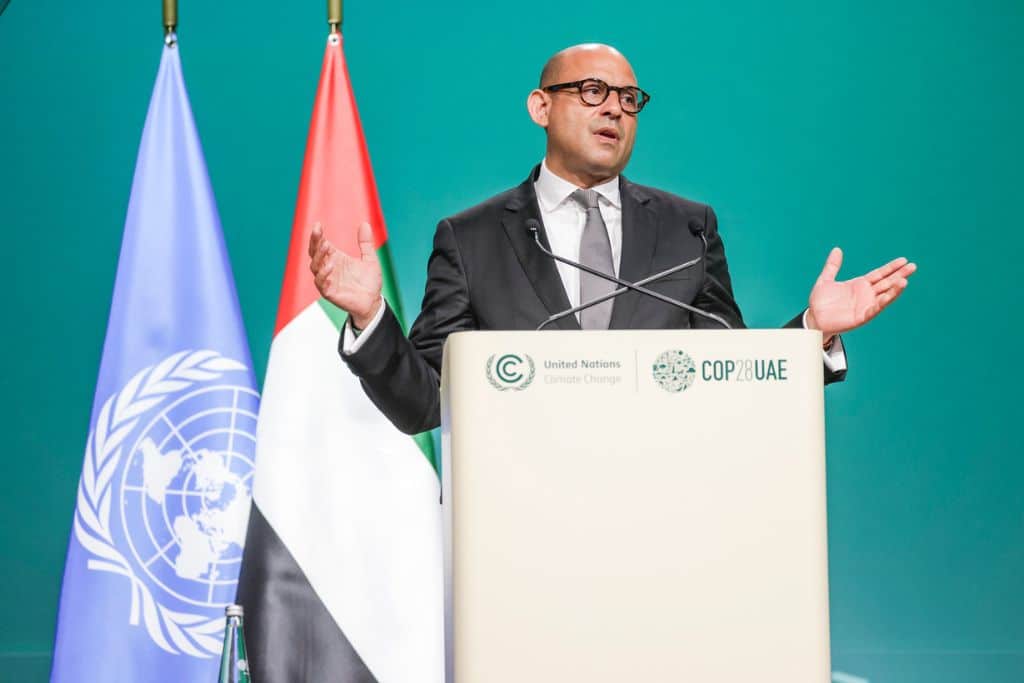Speaking in London on Wednesday, Simon Stiell appealed to big finance players to boost climate investments and on governments to put forward bolder national climate plans.
—
In a pivotal year for democracy, where roughly half of the human population is called to the polls, the United Nations climate chief called on citizens to “raise their voices” to demand bolder climate action.
With the relentless rise in air and sea temperatures globally, time is running out to avert the worst consequences of climate change.
Extreme weather events are costing millions of lives and billions of dollars to the world’s economies, with no country spared. A recent analysis by Zurich-based reinsurance company Swiss Re’s found that climate-change triggered natural disasters, excluding heatwaves, cost the global economy US$200 billion every year, with the US and the Philippines paying the highest annual price in relation to their gross domestic product (GDP).
Speaking at London’s Chatham House on Wednesday, UN Climate Change Executive Secretary Simon Stiell laid out key interventions needed ahead of the next COP summit and their long-term significance.
“The next two years are essential to save the planet,” Stiell said, stressing that cutting fossil fuel pollution and investing in climate mitigation and adaptation will determine which countries will “rise up the ladder [of living standards] or fall.”
Cutting greenhouse gas emissions from fossil fuels has proven challenging and progress has been slow. NOAA’ latest data, published earlier this week, confirmed that levels of all three main planet-warming, human-caused greenhouse gases – carbon dioxide (CO2), methane, and nitrous oxide – reached record highs in 2023, albeit growing at a slower pace than previous years.
Current national climate plans will “barely cut emissions at all by 2030,” Stiell said, stressing that a “new generation of national climate plans” ahead of the next round of UN climate talks scheduled for November is needed for a “chance to make greenhouse gas emissions tumble.”
Historically, G20 countries have been the main source of global emissions – accounting for around 80% of the total – and it is their responsibility, Stiell said, to “be at core of the solution” and work towards speeding up the phase-out of fossil fuels.
The Unequivocal Role of Climate Finance
For a chance to bring global temperatures down, cutting fossil fuels must happen concurrently with the rollout of clean energy technologies and resilient infrastructure, Stiell said, something that only a “quantum leap in climate finance” – which is “both essential and entirely achievable” – will help developing countries achieve.
“It’s time to shift those dollars from the energy and infrastructure of the past, towards that of a cleaner, more resilient future…And to ensure that the poorest and most vulnerable countries benefit.”
Despite poor and vulnerable countries raising their voices for decades to demand financial support to deal with the climate crisis, many believe that wealthy nations are not doing enough, with finance flowing still far from what is needed. The establishment of a Loss and Damage Fund in 2022 and its operationalization, hailed “historic,” at COP28 last year marked a significant step forward in the fight for climate justice. However, contributions to the fund still fall significantly short of what is needed to cover the real needs of developing countries, estimated at at least $400 billion per year and expected to grow as the crisis intensifies.
You might also like: Climate Justice and Loss and Damage: A Look At What COP28 Meant for Historical Responsibility in Climate Action
In his speech, Stiell called on key finance players – including the World Bank, the International Monetary Fund (IMF) as well as the G7 and G20 leadership – to push for a bolder climate finance deal at COP29 in Baku, Azerbaijan, saying it would not only benefit developing countries but also help protect global supply chains all economies depend on.
The deal, Stiell said, will have to satisfy four key requirements: more concessional finance, especially for vulnerable economies, new sources of international climate finance, a reform of development banks to make them work better for developing countries and take climate into consideration in their decision-making process, as well as debt relief for the countries in need to “give them the fiscal space for climate investment.”
A Pivotal Year
Recent polls have demonstrated that voters increasingly want to see their governments take bolder climate action.
Addressing the billions of people eligible to vote around the world this year, Stiell said their voice mattered like never before, stressing that only addressing the climate crisis will allow us to end poverty, hunger, and other pressing social and humanitarian problems affecting our societies.
“Business-as-usual will further entrench the gross inequalities between the world’s richest and poorest countries and communities that unchecked climate impacts are making much worse… If you want bolder climate action, now is the time to make yours count,” he said.
Featured image: UNclimatechange/Flickr
This story is funded by readers like you
Our non-profit newsroom provides climate coverage free of charge and advertising. Your one-off or monthly donations play a crucial role in supporting our operations, expanding our reach, and maintaining our editorial independence.
About EO | Mission Statement | Impact & Reach | Write for us


















